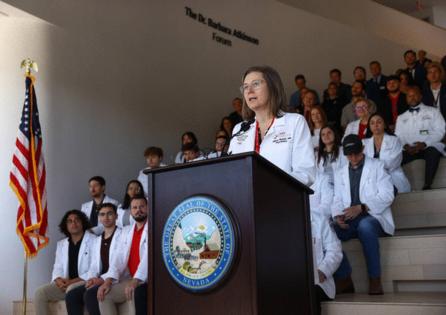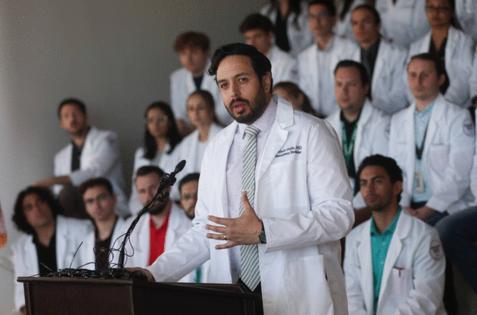Nevada governor tackles doctor shortage, insurance red tape in health care plan
Published in News & Features
Gov. Joe Lombardo proposed reforming health care in Nevada in his final priority bill introduced Thursday — less than three weeks from the end of the legislative session.
Senate Bill 495, called the Nevada Healthcare Act, would tackle the state’s health care provider shortage, expand mental health services and streamline health care, Lombardo said while flanked by dozens of medical students, educators and doctors for the introductory press conference.
“Adequate health care remains a pressing problem within Nevada,” Lombardo, a Republican, said at UNLV’s Kirk Kerkorian School of Medicine in Las Vegas. “Right now, Nevadans seeking medical care face long wait times and have trouble accessing specialists.”
The 100-page bill seeks to reform Nevada’s health care system by increasing funding for graduate medical residency programs, regulating prior authorizations and establishing a $25 million fund for workforce shortages, among other policy proposals.
Lombardo first previewed his plans in his State of the State address in January. At the time, he also proposed splitting the Department of Health and Human Services to create a separate Nevada Health Authority. That was not detailed in Thursday’s bill. The governor’s staff said the Health Authority will be created through a separate budget bill.
Bill proposals
The Nevada Healthcare Act would create the Office of Mental Health, which would focus on mental health care expansions, coordinate with behavioral health agencies and identify ways to improve the mental health care shortage in the state, according to the bill.
SB 495 would create a $25 million per year competitive grant program for people or programs seeking to address Nevada’s health care provider shortage. The governor’s office said the fund would focus on high-need specialties and rural or underserved areas and would be managed by the new Nevada Health Authority.
Other proposals in the bill include a prohibition on noncompete clauses for health care providers; authorizations to allow paramedics to work or volunteer in hospitals in certain circumstances; a comprehensive study assessing the development of an academic medical center in the state, and streamlined licensing and credentialing for doctors, dental hygienists and assistants.
Lombardo and doctors highlighted the proposed changes to the prior authorization process, when providers must get approval with a patient’s insurance before proceeding with a drug or treatment plan. SB 495 would prohibit insurers from requiring prior authorization for covered emergency services, standardize the timeline and require insurers to set up an electronic system for such requests.
Nehal Naik, an emergency physician in Las Vegas, said bureaucracy has caused “serious harm” to some patients. He said his wife, a gastroenterologist, had a patient with Crohn’s disease who was waiting for prior authorization for a new treatment. That patient was later referred to his emergency department for their worsening symptoms while awaiting the treatment and was eventually admitted to the hospital, Naik said.
“When patients are denied or delayed care, they often end up in emergency departments, like mine, in worse conditions than when they first sought help,” Naik said.
Shared goals
Senate Democratic caucus leaders declined to comment on SB 495. Lombardo told reporters he has been working with leadership on the bill, which could be heard in front of state senators on the Health and Human Services committee “soon.”
Potential cuts to Medicaid have also been a concern for state lawmakers as Congress debates ways to extend 2017-era tax cuts. Stacie Weeks, Medicaid administrator for Nevada, said the reconciliation bill may not have as significant an impact as the state initially projected.
“It is not as damaging to the state of Nevada,” Weeks said. “There are some new program requirements for eligibility, but it’s not as big in terms of cuts that we expected for the state.”
Some of the policies presented in Lombardo’s bills have already been introduced in other legislation, indicating a consensus could be reached in several areas.
For instance, Senate Bill 262, sponsored by Sen. Julie Pazina, D-Las Vegas, would move the Graduate Medical Education Grant Program to the Department of Health and Human Services and expand the program to some institutions that offer residency training programs. Lombardo’s bill also includes those policies and adds that the state should explore ways to use Medicaid funds to support residency programs.
Lombardo told reporters he was aware of “competing legislation” but was not picky about which bill makes it to his desk.
“As long as it moves us forward in what we’re trying to achieve, I don’t care who takes the credit,” he said.
SB 495 is the last of Lombardo’s five pieces of priority legislation to be introduced. So far, only his housing proposal — Assembly Bill 540 — has received a hearing.
The Legislature adjourns on June 2.
_____
©2025 Las Vegas Review-Journal. Visit reviewjournal.com.. Distributed by Tribune Content Agency, LLC.












Comments